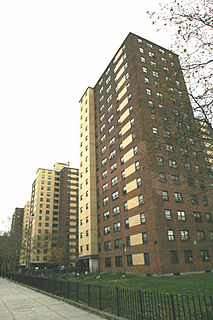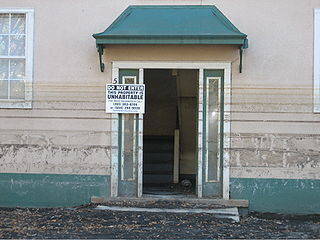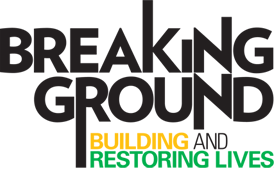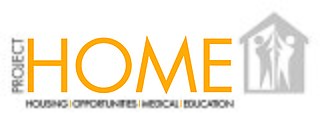
The United States Department of Housing and Urban Development (HUD) is a Cabinet department in the executive branch of the U.S. federal government. Although its beginnings were in the House and Home Financing Agency, it was founded as a Cabinet department in 1965, as part of the "Great Society" program of President Lyndon Johnson, to develop and execute policies on housing and metropolises.
Homelessness in Canada has grown in size and complexity since 1997. While historically known as a crisis only of urban centres such as Montreal, Laval, Vancouver, Edmonton, Calgary, and Toronto, increasing homelessness in suburban communities requires new services and resources.
Shelter is a registered charity that campaigns to end homelessness and bad housing in England and Scotland. It gives advice, information and advocacy to people in need, and tackles the root causes of bad housing by lobbying government and local authorities for new laws and policies to improve the lives of homeless and badly housed people. It works in partnership with Shelter Cymru in Wales and the Housing Rights Service in Northern Ireland. The charity was founded in 1966 and raised 60.9 million pounds in 2016/17.

Brownsville is a residential neighborhood located in eastern Brooklyn in New York City. The neighborhood is generally bordered by Crown Heights to the northwest; Bedford–Stuyvesant and Cypress Hills to the north; East New York to the east; Canarsie to the south; and East Flatbush to the west.
Supportive housing is a combination of housing and services intended as a cost-effective way to help people live more stable, productive lives, and is an active "community services and funding" stream across the United States. Supportive housing is widely believed to work well for those who face the most complex challenges—individuals and families confronted with homelessness and who also have very low incomes and/or serious, persistent issues that may include substance use disorders, mental health, HIV/AIDS, chronic illness, diverse disabilities or other serious challenges to stable housing. Supportive housing can be coupled with such social services as job training, life skills training, alcohol and substance use disorder treatment, community support services, and case management to populations in need of assistance. Supportive housing is intended to be a pragmatic solution that helps people have better lives while reducing, to the extent feasible, the overall cost of care. As community housing, supportive housing can be developed as mixed income, scattered site housing not only through the traditional route of low income and building complexes.

The reconstruction of New Orleans refers to the rebuilding process endured by the city of New Orleans after Hurricane Katrina destroyed much of the city on August 29, 2005. The storm caused levees to fail, releasing tens of billions of gallons of water. The levee failure contributed to extensive flooding in the New Orleans area and surrounding parishes. About 80% of all structures in Orleans Parish sustained water damage. Over 204,000 homes were damaged or destroyed, and more than 800,000 citizens displaced — the greatest displacement in the United States since the Dust Bowl of the 1930s. Wind damage was less severe than predicted. The damage that took place that needed to be repaired cost about $125 billion.

Homelessness in Australia is a social issue concerning the number of people in Australia that are considered to be homeless. There are no internationally agreed upon definitions of homelessness, making it difficult to compare levels of homelessness across countries. A majority of people experiencing homelessness long-term in Australia are found in the large cities of Sydney, Melbourne, Brisbane and Perth. It is estimated that on any given night approximately 116,000 people will be homeless and many more are living in insecure housing, "one step away from being homeless". A person who does not obtain any shelter is often described as sleeping 'rough'.
Housing First is a policy that offers permanent housing as quickly as possible to homeless people, and other supportive services afterward. Begun in 1988 to address the needs of homeless families with children in Los Angeles, California, Housing First was popularized in the following decades and became government policy in the United States and various other countries.
The Coalition on Homelessness is an American homeless advocacy and social justice organization that focuses on creating long-term solutions to homelessness, poverty, and housing issues in San Francisco, California. Founded in 1987, the group also founded the newspaper Street Sheet, the Community Housing Partnership, and the Western Regional Advocacy Project (WRAP).

Breaking Ground, formerly Common Ground, is a nonprofit social services organization in New York City whose goal is to create high-quality permanent and transitional housing for the homeless. Its philosophy holds that supportive housing costs substantially less than homeless shelters — and many times less than jail cells or hospital rooms, and that people with psychiatric and other problems can better manage them once they are permanently housed and provided with services. Since its founding in 1990 by Rosanne Haggerty, the organization has created more than 5,000 units of housing for the homeless. "This is about creating a small town, rather than just a building," according to Haggerty. "It's about a real mixed society, working with many different people." Haggerty left the organization in 2011 to found Community Solutions, Inc. Brenda Rosen was promoted from Director, Housing Operations and Programs to Executive Director, and has led the organization since.

Homelessness is defined as living in housing that is below the minimum standard or lacks secure tenure. People can be categorized as homeless if they are: living on the streets ; moving between temporary shelters, including houses of friends, family and emergency accommodation ; living in private boarding houses without a private bathroom or security of tenure. The legal definition of homeless varies from country to country, or among different jurisdictions in the same country or region. United States government homeless enumeration studies also include people who sleep in a public or private place not designed for use as a regular sleeping accommodation for human beings. People who are homeless are most often unable to acquire and maintain regular, safe, secure and adequate housing due to income that is inconsistent or lacking altogether. Homelessness and poverty are interrelated. There is no methodological consent on counting the homeless and identifying their special needs; thus in most cities only estimated homeless populations are known.
Rosanne Haggerty is an American housing and community development leader, and founder of Common Ground Community and later of Community Solutions. Haggerty redeveloped the Times Square Hotel, a building on the National Register of Historic Places, reducing homelessness by 87 percent in the 20-block neighborhood around it.

Project HOME is a nationally recognized 501(c)(3) non-profit organization that provides housing, opportunities for employment, medical care and education to homeless and low-income persons in Philadelphia, Pennsylvania.
The Vulnerability Index is a survey and analysis methodology for "identifying and prioritizing the street homeless population for housing according to the fragility of their health". It is a pragmatic methodology based on concern and inquiry into the reasons for recurring fatalities of homeless living in the outdoor urban context. It was developed by Jim O'Connell of Boston Health Care for the Homeless Program.
The 100,000 Homes Campaign was an initiative of Community Solutions designed to "help communities around the country place 100,000 chronically homeless people in 186 communities in the United States into permanent supportive housing." Due to the cost of emergency department treatment, the program aims to provide housing for the homeless, as it is cheaper in the long run. In 2014, the program was featured on 60 Minutes, focusing on the homeless population in Nashville, Tennessee. Becky Kanis Margiotta was the campaign director. By July 2014, the 100,000 Homes Campaign had reached its goal and housed 105,580 of the most vulnerable homeless individuals.

The San Francisco Bay Area comprises nine northern California counties and contains four of the ten most expensive counties in the United States. Strong economic growth has created hundreds of thousands of new jobs, but coupled with severe restrictions on building new housing units, it has resulted in an extreme housing shortage which has driven rents to extremely high levels. The Sacramento Bee notes that large cities like San Francisco and Los Angeles both attribute their recent increases in homeless people to the housing shortage, with the result that homelessness in California overall has increased by 15% from 2015 to 2017. In September 2019, the Council of Economic Advisers released a report in which they stated that deregulation of the housing markets would reduce homelessness in some of the most constrained markets by estimates of 54% in San Francisco, 40 percent in Los Angeles, and 38 percent in San Diego, because rents would fall by 55 percent, 41 percent, and 39 percent respectively. In San Francisco, a minimum wage worker would have to work approximately 4.7 full-time jobs to be able to rent a two-bedroom apartment.
Homeless veterans are persons who have served in the armed forces who are homeless or living without access to secure and appropriate accommodation.
Community Housing Partnership is a nonprofit organization in San Francisco, California, that provides housing, job training and other services to people formerly living in homelessness. Founded in 1990, it owns and operates 14 residential buildings and collaborates with other organizations in its goals.
Nate Miley is a member of the Alameda County Board of Supervisors and represents District 4 in Alameda County, California. He was first elected in November 2000 after serving on the Oakland City Council from the 6th district. After decades of community organizing in Oakland founding United Seniors of Oakland and Alameda County, his passion for advocating for senior citizens and improving the quality of their lives remains a top priority as well as continuing improvements to transportation, healthcare, public safety, and social services to his diverse constituents of Oakland, Pleasanton, and the unincorporated communities of Ashland, Fairview, Castro Valley, and Cherryland. Miley is a proud father of two children and three grandchildren and has lived in Oakland, California for more than 30 years. Miley has dedicated his entire adult life to community and public service.








